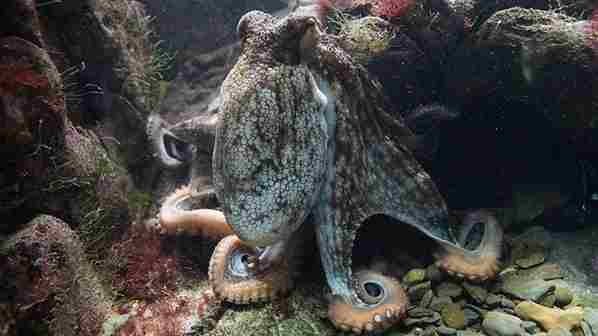Do Octopus Feel Pain? What Science Says!
Pain in octopuses and many other sea animals generally has always been a controversial topic. If you’re here, you’re probably fond of the octopus, and you’re wondering if it can feel pain like humans.
Octopuses are highly intelligent and sophisticated animals with a decentralized nervous system. While octopuses lack a traditional centralized brain like mammals, their nervous system is spread throughout their body, including their arms.
In this article, we will look at the subject of pain and how it’s experienced in octopus and a few other shellfish.

Do octopus feel pain?
Octopus do feel pain when they are exposed to hurtful sensations. This can be seen in how they react towards the location where they felt the initial painful sensation. They tend to avoid the spots where they felt pain, just like the way humans avoid contact with fire after getting burnt for the first time.
It is worth mentioning that an octopus’ response to pain is not merely a simple reflex to the source of pain (stimuli) or injury. It’s more than that! In fact, just like humans, their experience of pain can be seen as a complex emotional state, which can lead to suffering or distress.
Another evidence that suggests octopus feel pain is their response to analgesics. Analgesics are substances that produce a diminished sensation of pain.
Studies show that, during an experiment, octopuses that were given analgesics (lidocaine) showed lesser response to pain compared to the ones that weren’t after both were subjected to the same noxious stimulus. Their ability to react to analgesics shows that they feel pain, unlike sea urchins, that do not respond to these substances.
Do octopus feel pain when cut?
Absolutely! Just like humans and other mammals, octopus feel pain when cut alive. They have about sixty-percent of their nerve cells situated in their arms, so if you cut their arms, they’d feel the most pain there.
Do octopus feel pain when boiled?
Octopuses also feel pain when boiled or cooked alive. As a matter of fact, in some places, cooking octopus alive is usually regarded as cruelty. They have receptors and nerve cells that respond to different temperatures.
Octopus are usually found in deep marine waters, although some species of octopus are pelagic, meaning they are found in shallow waters. These deep waters have little access to sunlight, making them quite cool. Boiling an octopus is subjecting them to a temperature that is the complete opposite of their natural habitat, which can be a very painful experience.
How do we measure pain in octopus?
Before we talk about how pain is measured in octopus, we need to understand the concept of pain. Pain has many definitions, it can be said to be an unpleasant sensory or emotional experience, which may be associated with actual or potential tissue damage. It is a warning mechanism that protects organisms by influencing them to withdraw from a harmful stimulus.
Measuring pain intensity
It is quite difficult to measure the intensity of pain in animals because we’re not the ones feeling it. It is even more difficult to measure pain in invertebrates because most of them are not vocal. In humans, mammals, and many other vertebrates, pain is measured by the intensity of sounds made, rubbing against the affected areas, showing aggression, e.t.c
How pain is interpreted in humans
In humans, pain is interpreted in the brain and carried to the brain via nerve fibers. Sharp pain is carried by C-fibers, while dull pain is carried via A-delta fibers. For example, when you touch a hot surface, you immediately react by removing your hand from the surface. Simultaneously, the nerve fibers carry the signal from the affected part to the brain, which interprets the signal and facilitates the release of several hormones, making you feel pain.
How pain is interpreted in octopus
In octopuses, pain is measured based on their behavioral pattern, physiological factors, and tendency to avoid the location where they felt the sensation.
For decades, the subject of pain has been a very controversial topic, particularly with regard to how it’s experienced. These include both physical and emotional pain. Octopuses feel both types of pain.
Can octopus have emotions?
Despite their scary, alien-like looks, octopus have emotions. You’ll be surprised at the way they behave when they see a loved one or how a female octopus takes care of her babies.
Female octopuses reproduce only once in their lifetime and die after their eggs hatch. This is because once they reproduce, they direct all their energy into taking care of the eggs.
After laying their eggs, female octopuses do not eat; they spend their whole time guarding the eggs, cleaning them, and aerating them.
Can octopus feel affection?
Yes, an octopus can feel affection. You might be thinking, isn’t emotion the same as affection? Well, these two words are usually used interchangeably, but they’re quite different.
Emotion is a broader form that encompasses pain, distress, affection, and so on. Octopuses also feel affection. As a matter of fact, studies show that they are capable of recognizing loved ones like their trainers or individuals that own them.
Can an octopus feel fear?
Fear can also be classified as an aspect of emotion, which means that octopuses also feel fear. Octopuses have the ability to change color. They usually do this when they’re scared or when they feel threatened.
Most times, when they feel threatened, they darken in color and become brighter when they feel fear. Additionally, some species turn red, which signifies anger.
How much pain does an octopus feel?
Currently, the intensity of pain an octopus feels can not be accurately measured. Scientists are still looking to develop means by which we can measure pain in invertebrates.
Even for humans, it is very difficult to tell the intensity of pain a person is experiencing. We can only imagine the intensity by their actions, facial expressions, and the sound they produce.
While octopuses can indeed produce sounds, they are generally considered quiet animals. This makes it harder to rely on their sounds as a means to determine the intensity of pain they might experience.





